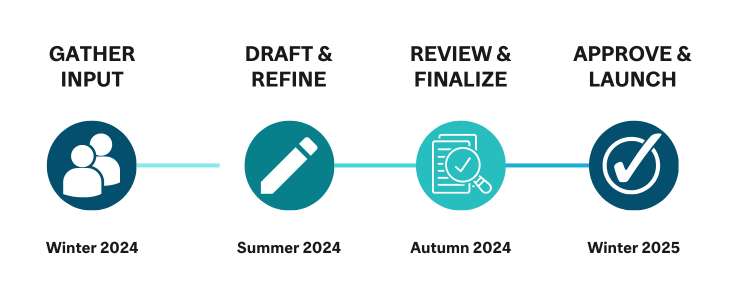McGill's Sustainability Office (MOOS) is co-developing the University's upcoming Climate & Sustainability Strategy. The key to the strategy's success lies in gathering input from all members of the McGill community, including students, staff, and faculty. Through a thorough consultation process, we aim to capture diverse perspectives, address priorities, and tackle concerns.
Following completion, the draft strategy will undergo review by McGill’s Board of Governors.
Understand the timeline

Community contributions to the strategy
To capture the diversity of voices within the McGill community, in Winter 2024 we established a Community Vision Board. It provided an easy and anonymous way to contribute your ideas or show support for those of others.
Feedback was collected until Tuesday, April 30th, 2024. Consult the final Community Vision Board now! Editing is now closed.
Our contributors took inspiration from their experiences and interests, the current strategy, or from consulting McGill's achievements to date in our recent annual reports.
As we progress further in preparing the forthcoming Climate & Sustainability Strategy 2025-2030, feel free to familiarize yourself with the various priority areas for sustainability at McGill in the carousel below.
Explore the priority areas
- Research & Education
- Buildings & Utilities
- Travel & Commuting
- Food Systems
- Procurement
- Landscape & Ecosystems
- Community Building
- Waste Management
Research & Education
McGill aims to identify strategies to increase learning and research opportunities in sustainability. This includes:
- Providing essential sustainability education for students
- Increasing sustainability-related research opportunities
- Reducing the environmental impacts of current research activities
Buildings & Utilities
McGill aims to increase the environmental performance of buildings while reducing their carbon footprint. This includes:
- Transitioning from natural gas heating to electric systems
- Investing in energy efficiency upgrades
Travel & Commuting
Travel and commuting at McGill is responsible for about one-third of the University’s greenhouse gas emissions! Therefore, McGill aims to develop initiatives to reduce the carbon footprint of commuting activities, directly funded air travel, and McGill’s vehicle fleet. This includes:
- Upgrading McGill’s vehicle fleet to electric
- Reducing directly funding air travel
- Enhancing cycling infrastructure
Food Systems
McGill aims to make its food system, including its supply chain, more sustainable and promote more sustainable food offerings. This might involve:
- Sourcing from local, sustainable vendors
- Increasing the amount of plant-based options on campus
- Reducing packaging and food system waste
Procurement
Procurement refers to the process of sourcing, purchasing, and receiving goods or services. McGill aims to promote sustainable supply chains and contribute to the development of a circular economy. This includes:
- Exploring and improving decision-making regarding the procurement of goods, services, and assets
- Supporting greater transparency and accountability in McGill’s supply chains
Landscape & Ecosystems
Through the University’s grounds management, McGill aims to develop landscaping projects that reduce the heat island effect, increase biodiversity, and foster well-being. This includes:
- Increasing green spaces across campuses
- Harnessing the potential for nature-based solutions to climate change
- Prioritizing biodiversity and native species
Community Building
A central part of McGill is building connections amongst its community members and integrating social sustainability in all areas of the University. McGill aims to create a diverse, vibrant, and rich community where all feel a sense of belonging. This includes:
- Amplifying programs that foster a culture of sustainability
- Increasing Indigenous representation and input
- Supporting well-being and inclusion of diverse voices
Waste Management
Waste management at McGill refers to proper management (reducing, reusing, recycling, and composting) of waste. This means responsible consumption and disposal at the University, following the principles of a circular economy. This includes:
- Enhancing sustainable procurement practices
- Reducing water and energy use
- Bolstering sustainability in food and dining practices
- Minimizing waste through optimizing the institution’s reduction, collection, and sorting practices
Have a question about the strategy consultation process? Don't hesitate to email us at strategy.sustainability [at] mcgill.ca. For general information about sustainability at McGill, explore our website, including the FAQ page, or take the McGill Sustainability Module.

